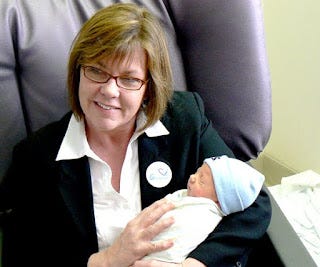Living Proof
Debbie looked away as the nurse pressed gently just above her collarbone. She was nervous, and it unnerved me to see my mother-in-law—a middle school teacher used to handling stressful situations—looking so ill at ease. I had witnessed this woman wrangle thirty sixth-graders at a theme park like Calamity Jane on a cattle drive. If she couldn't handle this, well...the situation was dire.
“Can you see the little triangle?” Debbie asked April, her nurse for the day.
“I sure can,” April replied.
I watched as April located the portacath in Debbie's chest and inserted the needle into a triangular opening only visible as a vague impression, at least to me. A strangely edged lump pushing outward from beneath Debbie's skin.
“Is it in?” Debbie asked with a sidelong squint.
“Yep.”
She smiled at the nurse and whispered, “That didn't hurt at all.”
* * *
Nineteen years ago, almost to the week, Debbie was diagnosed with stage 3 breast cancer. Noah, her middle son and my husband, was just 8 years old. When she talks about that experience, what it did to her three boys typically takes precedence over what she went through, which was considerable: She had a double mastectomy, chemotherapy and radiation that left permanent scarring on her chest. It's what Noah said to her when she came home from the hospital, though, that she returns to again and again.
“I need to see what they did to you,” Noah demanded. So she showed him her scars beneath the bandages, the incisions leaving the last bit of evidence that there had been breasts there once.
By the time I met Debbie, she had been cancer-free for ten years. Not long after her fifteen-year remission anniversary, she underwent a second breast reconstruction. The original implants disintegrated, leaving her with constant pain and discomfort.
The second time around, she saw a specialist in New Orleans who, using fat from Debbie's own body, would construct breasts of living tissue. The procedure was broken into several painful surgeries over the course of a few months. Finally, she was well.
That's why we were stunned when in January her doctor in New Orleans called with the results of the pathology done on some scar tissue he removed from her right breast. She had cancer again.
* * *
After dispensing an anti-nausea drug and benadryl, April hooked a bag of chemotherapy drugs into Debbie's IV. It was her first chemotherapy session in almost two decades. Before, she had been stuck so many times her veins kept collapsing. This time, the portacath took care of that. The pain of ice-cold toxins flowing directly into an arm vein was happily a faint memory.
The side-effects would unfortunately remain the same: flu-like symptoms, nausea, mouth sores, hair loss.
“There went the hair-taker,” Debbie told me after the first bag of chemo triggered a series of beeps indicating it was empty. “Next comes Herceptin.” At that, we looked at each other and smiled.
Debbie's cancer is HER2-positive, meaning it's particularly aggressive. Her team of doctors discovered the original cancer was HER2-positive as well after testing a tumor sample. (Apparently they keep these things in storage, which to me sounds a little Area 51ish. Then again, I'm a confirmed pansy.)
In 1990, women with HER2-positive cancer had no recourse. They endured harsh levels of treatment and survived on prayers and luck. Debbie was one of the lucky ones.
Although this cancer is an invasive scoundrel, we have Herceptin to give us hope. Debbie loaned us her rented copy of Living Proof, a Lifetime movie that documented the history of Herceptin including how so many times the research was nearly quashed. The belief and perseverance of just a few individuals made this drug a reality for thousands of patients who might otherwise have been terminal. Right on cue, Noah and I cried several times. Genuine tears! The thing is, it's a miracle drug for women like Debbie.
As Nurse April adjusted the dose rate, Debbie and I talked with a young woman in the treatment chair across from us. Her name was Laura, and she was just 28. Not two years older than me. Double mastectomy, chemotherapy, radiation. Before she cuddled up with her blanket and portable DVD player, I noticed the slogan on Laura's shirt: Fight Like A Girl.
April finished fiddling with the machine and told us she'd be back soon to check the progress. Debbie leaned back and closed her eyes. As the clear liquid began its slow drip, I looked at her and knew.
Everything's going to be all right.



